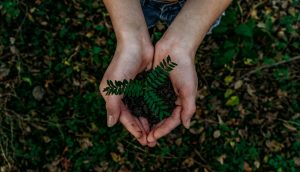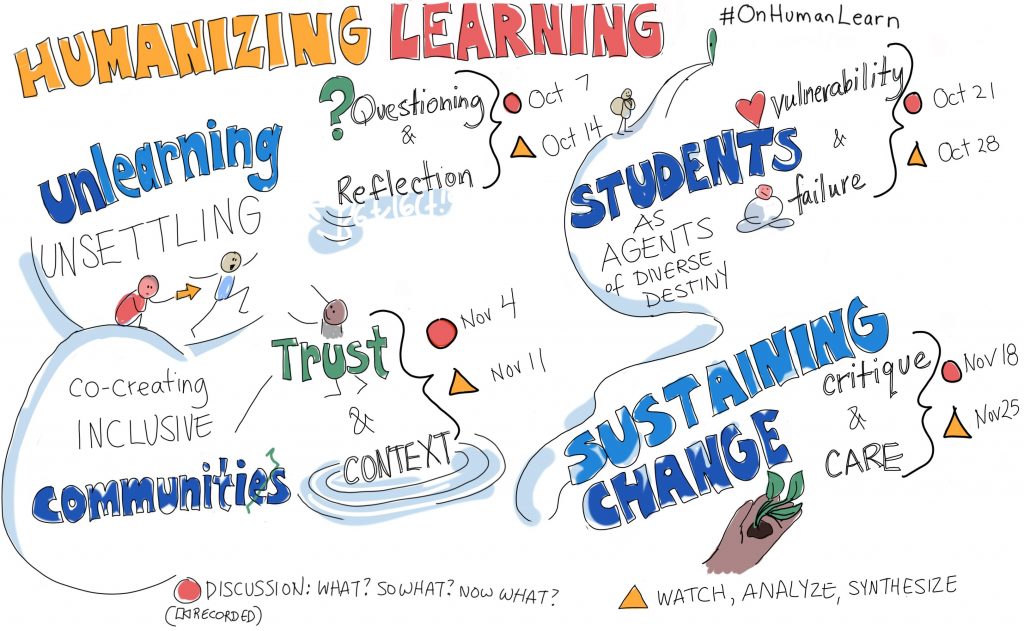What Is a Deliverable? What Have We Delivered?
![]()
This is a project, generously funded by the Ministry of Colleges and Universities of Ontario and carried out through eCampusOntario’s Virtual Learning Strategies grant program.
In the grant we stated:
The multi-institutional team will co-design four “living modules” that consider the many nested and entangled functions of the academic ecosystem. Each module will provide learning experiences and supports intended for relevant roles and functions in the academic structure — from students, to educators, services, administration, funders, policymakers, and the larger community.
Below you will find the four “living modules” and rich references, further reading, and more. You will also find artifacts that were created over the past year on the project. And you will also find musings about the process of creating a community that collectively did this work. In many ways, the team working on this project feels that the process was the deliverable. Time and again we marveled at how deeply the process had impacted us all. We want to capture some of that here, but please know that you cannot bottle this work up and reproduce it entirely. It does not scale — nor should it. What we can share are suggestions, stories, and experiences for how to do this work. We will also pepper the modules with what we learned along the way and areas we know need more work by us all. This is the journey that defies “completion.”
One team member asked, “Do we actually think that humanizing education will happen with four modules?” No, humanizing education will not be accomplished with four modules; the ways that humanizing education will happen is up to each of us and our interactions. Humanizing is fundamentally about relationships, interactions, and experiences with others. Humanizing education is fundamentally relational.
A word of warning: we built a community of practice supporting each other in doing this work. We are connected deeply and expect to remain connected beyond the timeline of this work. Humanizing work has this tendency; it brings people together to support, encourage, and challenge each other.
One last word of warning: this group has one hell of a sense of humour — perhaps it’s also an essential ingredient to this work. Surround yourself with real people who can laugh at themselves, and then extend that to everyone else.
4 Modules (that will not, in and of themselves, humanize learning)
Module 1: Unlearning and Unsettling
Questioning and Reflecting

Figure 1: Photo by Lukas Juhas on Unsplash
Among the domains to be examined are research, evidence, metrics, innovation, ways of knowing and expressing knowledge, value systems, work, intelligence, economics, decision-making, notions of quality, rigour, integrity, efficiency, winning, and trust as they relate to learning. To move forward we must interrogate how we practice now and why. Some of this is the uncomfortable work of unlearning and unsettling. We do this work by embracing questioning and reflecting as we explore the way education is designed (from the physical environment, the virtual environment, the interactional environment, and more). Among the lessons we learn in unlearning and unsettling are the following:
- Unbottle-able: we cannot package this work up and make it “scale.” Scale is a word that harkens to the economics of the enterprise, not to the learning outcomes or cultural impacts. We cannot copy and paste modules into different contexts and expect the same results. In fact, we should pause and consider the impact of expecting results at all. Many times, the process is more important than the outcome or any single outcome.
- Time to think, time to reflect, slow learning, importance of pauses: when do you take time to explore, wonder, critique, interrogate, question yourself and your own practices, as well as those of others and of institutions? Time and attention are perhaps our most valuable commodity, and it is in short supply. What is lost when we schedule meetings back-to-back and never have a moment to think, digest, let our minds wander to make connections? This is the sawdust of our work. As we cut clean, exact lines we create “waste” in the dust. But what if the dust is the good stuff? What if we accidentally leave something behind in the dust? What if the voices and the people we hope to reach the most with this work fall into the dust? We have to be aware and wary of every cut we make.
- Structured structurelessness: in doing this work we acknowledge the need for structure while simultaneously warning that too much structure can curtail curiosity and exploration. So, we advocate for only as much structure as is absolutely necessary for people to have clarity of purpose, but no more. And in that space that is created, we can all consider how things might be. We put education in a straitjacket and then we’re surprised when it isn’t whimsical, innovative, creative, and free. How do we interrogate the usefulness and uselessness of the structure in rubrics, checklists, gatekeeping, rigour, and prerequisites?
Module 2: Students as Agents of Their Own Diverse Destiny
Vulnerability and Failure
Diversity is our society’s most valuable asset. To address current and emerging demands, students must differentiate themselves and continue learning throughout life. This implies rethinking notions of student conformance to singular standards, biased exclusionary recruitment, systems of preferential academic ranking and promotion, reductionist assessment techniques, student surveillance and policing, and winner-takes-all competition, among other academic conventions. How do we equip students to value, develop, and apply their own unique contributions throughout life?
- Idolatry — ways to avoid prof-worship: one barrier to student agency is the traditional classroom model, which features the “sage on a stage,” bestowing knowledge on students who are often referred to “bums in seats.” This common understanding removes student agency and knowledge and inflates the status of the professor. Understanding the rigid hierarchical structures of higher education that we are situated within, how do we resist idolatry of those who occupy seats of power? In order to democratize learning and ensure that learners (who on aggregate have a greater range of lived experiences than the professoriate) have agency, we must make conscious effort to avoid worshiping, or contributing to the cult of personality, which oftentimes surrounds professors.
- Power is everywhere: make no mistake, where there are people, there is power. And whether or not those with power acknowledge their power, it is there. Human interactions within the realm of all that happens in education is no exception. Policies, practices, conversations, assessments, the ways the classroom are setup … everything can subtly or not so subtly convey power; saying, you belong here, or you do not belong.
Module 3: Co-Creating Inclusive Communities
Trust and Context
While diversity is our greatest asset, inclusion is our most important challenge. The academic mission of advancing learning and discovery, while doing no harm, is best served by an orchestration of diverse perspectives. Current academic processes pit students against students, faculty against faculty, and faculty against students; they create monocultures and biased, exclusionary hierarchies. The academic journey is often a lonely one, especially during the pandemic. How do we create a cohesive learning community out of dissonant and divergent perspectives, deal with conflict, listen to quieter minority voices, give and receive constructive critique, and share knowledge generously for collective benefit?
- Community guidelines and participation standards: some groups are publishing participation guidelines or codes of conduct. These can be helpful starting places for a group of people to agree on some standards, but these documents will only be strong if they are visited and revisited and critiqued and modified regularly. You can show your mettle by ensuring this is never a “one-and-done” activity, but rather a value that is embedded in everything you do and how each community member treats each other.
- Ethics and social justice: even when you dabble shallowly into humanizing learning, you are confronted almost immediately with issues of social justice and ethics. We argue that this is actually desirable and that change (cultural and therefore educational) will come from communities of practice, practicing this work together and striving to get better and better.
- Co-design and co-creation: first, we must start from a point where we acknowledge that power is everywhere. Co-design and co-creation fundamentally challenge and disrupt power. This topic requires much more interrogation and discussion to achieve flattened, co-created works. See more here: Creating Brave Spaces video and “What Is Co-Design?”
- Inclusive facilitation

Figure 2: Tweet from Ashley Yates regarding facilitation, May 18, 2021, https://twitter.com/brownblaze/status/1394748079090200577

Figure 3: Tweet from Viji Sathy regarding facilitation, October 1, 2021, https://twitter.com/vijisathy/status/1443958751883636736
Module 4: Sustaining Change
Critique and Care

Figure 4: Photo by Noah Buscher on Unsplash
Objective: To spark and sustain equitable system-wide change and adaptation in higher education.
Change is hard. Academia, as an institution, was built to resist change and uphold established practices. The flaws in the system — false scarcity, exclusion, rigid hierarchy — are not new, but have been exacerbated throughout the pandemic and demand address. Numerous innovative experiments in more inclusive, future-friendly learning have met insurmountable barriers and failed to thrive. How do we sustain change, complexity, and care in a system that was not designed for what our society currently demands of it?
How can we foreground care, hold the gains of learning that we may have made during the strange years of the pandemic, and sustain change? How can we learn the arts of care, critique, and apology in ways that enable us to contribute to the big picture of systemic change without getting derailed by ego? In this module, we’ll return to the liberating structure of what/so what/now what to explore practices of critical inquiry and change-making cycles, even in the face of weariness. We will also frame care as a more reciprocal process than the atomized versions of self-care packaged by our pandemic-era institutional Wellness emails and Wellness Theatre.
- Find/address friction points in complex systems
- Moving beyond optimizing the past, examining what is evidence, how we interpret rigour and quality, supporting culture change

Figure 5: A visualization of the Humanizing Learning co-design schedule from Fall 2021. Drawing by Giulia Forsythe. CC0

